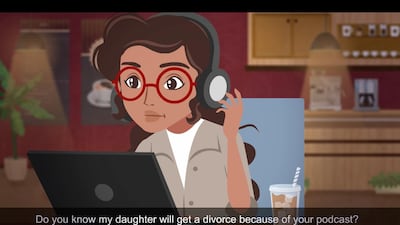The popular online Arabic animation B100Ragl has returned for a third season, with a new episode released online every Saturday.
The show, which began as a radio serial in 2014 before switching to the internet for season two in 2016, revolves around our heroine Noha, a journalist who encounters a wide range of social issues. The show has won over audiences – more than two million individual listeners and watchers for the first two seasons – with its willingness to tackle traditionally taboo subjects. Season three is no exception – the makers promise to tackle issues such as divorce, street harassment, equal opportunities, treatment in the workplace and positive messages around female leadership.
The show's co-creator, and founder of Palestine's NISAA FM, one of the radio stations that originally broadcast the first season, Maysoun Odeh Gangat, says: "We talk about things like sexual harassment and divorce, which are relevant all around the world, but particularly in the Arab world where these issues are encountered frequently by Arab women." Each episode sets out to allow the narrative to explore new perspectives on the challenges faced by women in the Arab world as Noha fights prejudice and oppression. Rafia Qureshi, executive director of the Womanity Foundation, which produces the show alongside local partners Lapis Communication and Kharabeesh, says: "Our aim through this work is to open up a space for debate on some of the challenges faced by women, and at the same time, to focus on their abilities to find solutions and to make valuable contributions to their community."
While the initial radio version of the show would be followed by an on-air debate about the issues raised in each episode, the new online platform allows for a much wider debate through the various social media platforms people view it on, and this was a key reason for the switch in format. Gangat says: "It's still basically the same team behind the show as it was in season one, although we've brought on board new production partners to help with the switch to an animated format from the second series."
“But the Arab world is very focused on social media, hence our decision to shift to social media. That also allows us to reach the youth better because the Middle East has a very young population and it’s great for them to be able to watch on a Facebook page.”
The switch to social media isn't the only evolution the show has gone through over its three seasons. In the show's first season, Noha was played by the popular Egyptian actress Mona Zaki, although she has since been replaced by Jordanian star Saba Mubarak. The show's theme tune has been through changes too – season one's jingle was produced and performed by Lebanese pop superstar Nancy Ajram, while Saudi/Jordanian/Iranian accapella star Alaa Wardi took on score duties for season two. Season three, meanwhile, has Egyptian rappers The Sharmoofers take control of the mic.
Ultimately, however, the show remains faithful to its first incarnation, and viewers can expect to see Noha undertake plenty more relatable and issue-raising, bite-size adventures – each of season three's 10 episodes comes in at an easily digestible, circa five-minute, run time. The Women's Day teaser showed Noha frustrated by her boss's attempts to force her to host a radio show full of beauty tips and celebrity gossip, dismissing her desires to talk about the burning issues of the day as "boring" and we will no doubt see her face many more challenges as the weeks go on.
Audiences can also join in the debate on the B100Ragl Facebook page, where they can also learn about real-world discussions and debates that the show's creators will be organising around the region in collaboration with community and women's organisations, as well as at Kharabessh's Amaan HQ.
As for the name, B100Ragl is an Egyptian expression qualifying influential and accomplished women that are said to be worth 100 men, and Qureshi hopes the show can provide a platform to many such women.
“When it comes to media and women’s empowerment, there is a common misconception that we need to empower women to use their voice,” she says. “We often forget that women already have a voice and more often than not, they just need a platform to be heard.
“Fiction and entertainment can be an engaging, non-confrontational way to set the scene for constructive conversations about gender dynamics and unconventional issues.
"That's how the conversations generated by B100Ragl can encourage men and women to take action and build a more just and equal society, together."
Watch B100Ragl on the B100Ragl Facebook page, on Kharameesh's YouTube Channel, or on MBC Shahid
______________
Read more:
Female stars dominate Cannes festival jury
Pulitzers reward publications for their #MeToo reporting
Executive Director of the Sundance Film Festival in Abu Dhabi seeking new artists and voices
______________

